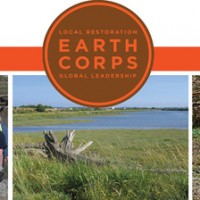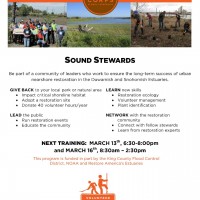What’s your role in keeping the Puget Sound healthy for future generations?
For 14 years, Puget Sound Stewards have been leading their communities in keeping shorelines healthy and protecting our sound. Bruce, who became a Steward in 1999 remembers:
I joined the Sound Stewardship Program because I wanted to be able to identify our native plants, and because I wanted to do something tangible to help restore our Northwest salmon runs. I learned so much about native plants, Northwest ecosystems, restoration ecology, local history, and salmon issues. I continue to learn through the program’s many activities and events, many years after my first classes.
Be part of a community of leaders who works to ensure the long-term success of urban restoration sites on the shores of the Duwamish from River to Estuary. As a Puget Sound Steward, you will:
- Give back to your local river by adopting a restoration site and impacting critical shoreline habitat
- Learn new skills in restoration ecology, volunteer management, plant identification
- Lead the public at restoration events and educate the community
- Network with the restoration community,connect with fellow stewards and learn from experts
The next Puget Sound Steward training is
coming up on June 19th and 22nd.
Click here to learn more about the Puget Sound Stewards Program
Sign up for the trainings on our Volunteer Calendar.
This training is in partnership with and partially funded by: Forterra, National Fish and Wildlife Foundation, FedEx, Restore the Duwamish and King County Flood Control District.



